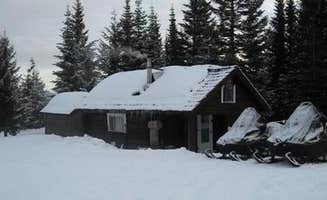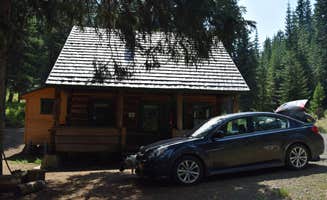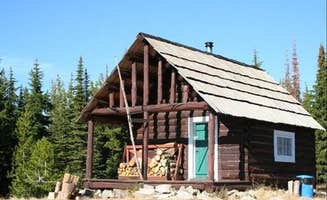Cabins near Elk City, Idaho range from primitive forest service lookouts to modern accommodations with full amenities. Located in the Nez Perce-Clearwater National Forests, these accommodations sit at elevations between 3,000-5,000 feet, creating seasonal access challenges during winter months. Many remote cabins remain inaccessible until late spring due to mountain snow conditions.
What to do
Explore historic mining sites: The Florence area near Adams Ranger Station offers numerous hiking opportunities focused on Idaho's gold mining history. As one visitor noted, "Florence is a well known location for gold mining in days past, nice place to hike and explore the area's history."
River activities: The Clearwater and Salmon Rivers provide excellent fishing, rafting and kayaking opportunities. Salmon River Resort offers direct river access, and according to a camper, "Nice resort 30/50 amp water and sewer. Nice grass area for tents. River access."
Mountain biking: The network of forest service roads surrounding cabins provides challenging terrain for mountain bikers. Trails range from moderate to difficult with significant elevation changes and technical sections. Most trails are unmarked, so bringing detailed maps is essential.
What campers like
Scenic vistas: Castle Butte Lookout provides panoramic views that campers consistently praise. One visitor shared, "lookout tower with great views of the lochsa river canyon and hwy 12. located along the Lolo motorway."
Peaceful settings: The remote nature of many cabins ensures quiet surroundings. At Three Rivers Resort & Campground, one camper appreciated that "The resort is located along a sweeping bend of the Lochsa river, which the highway follows on the opposite side."
Restaurant access: Several cabin locations offer on-site dining options, eliminating the need to cook. A visitor to Three Rivers Resort mentioned, "The hamburgers at the restaurant were perfect for our tastebuds after a long day on the road."
What you should know
Road conditions: Access to remote cabins often requires high-clearance vehicles. A visitor to Liz Butte Cabin warned, "Road to this place is not recomended for low clearance vehicles it is a very rugged road and allows for a great experience in the wild most years you won't get there very early in the year because of snow."
Limited connectivity: Most cabins have no cell service or internet. Prepare all navigation materials beforehand. Many cabins require visitors to be completely self-sufficient.
Reservation requirements: Most cabins must be reserved well in advance, especially during summer months from June-August. Forest Service cabins typically book 6 months ahead, while private accommodations like Bear Den RV Resort may accommodate last-minute bookings.
Tips for camping with families
Consider partly-developed options: For families with young children, Kamiah/Clearwater River KOA offers amenities that balance convenience and outdoor experience. A visitor mentioned, "We had a wonderful time!! People are so friendly!! Nice shade trees all over, pool was great! Bathrooms where clean!!"
Pack entertainment: With limited electronic distractions, bring games and activities. The elevation means cooler evenings even in summer, so pack appropriate clothing layers.
Prepare for weather changes: Mountain elevations experience rapid weather shifts, even in summer. Daily temperature swings of 30-40 degrees between day and night are common, requiring appropriate clothing and sleeping gear.
Tips from RVers
Service availability: Bear Den RV Resort offers full hookups and accommodates larger rigs. A camper noted, "Campground is located a mile outside of town. Friendly staff and nicely maintained campground. There are a few small trees but mostly in the sun. Sites are close together. Big rig friendly and mostly pull through sites."
Plan your route carefully: Many forest roads leading to cabins have tight turns and steep grades that are challenging for larger RVs. Measure clearances before attempting access to remote sites.
Dump station locations: Limited sanitary dump facilities exist in the area, so plan accordingly. Some RVers recommend emptying tanks in larger towns before heading to more remote areas.




